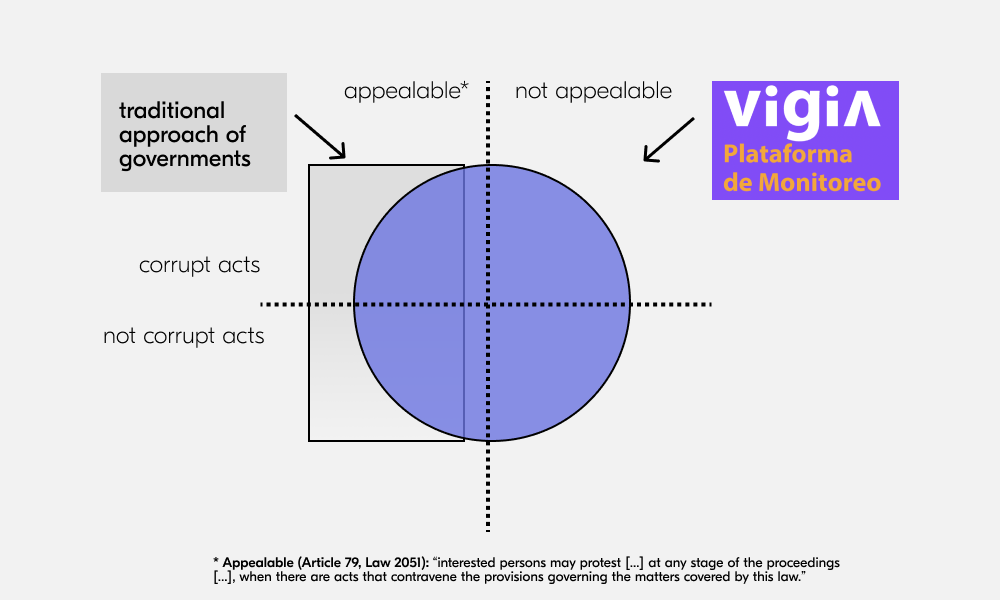Vendors as partners: How Paraguay’s VIGIA provides a community to increase competitiveness and opportunity for SMEs

VIGIA is a unique initiative that allows entrepreneurs to easily find public procurement business opportunities in Paraguay, as well as provide real-time high-quality feedback about irregularities. The platform was co-developed by OCP and the business community together with the government. It is fueled by feedback from entrepreneurs, helping to mitigate barriers to entry and streamline the purchasing processes. Within just three months since its launch, VIGIA has seen more than 3,000 users, and over US $300,000 has been awarded to small businesses.
“Small businesses struggle to understand how to bid for public contracts and put time aside to apply to this market, especially as they normally don’t have someone dedicated to that tasks,” highlights Cristian Sosa, Vice President of Paraguayan business association ASEPY that supports smaller businesses.
Small and medium enterprises (SMEs) represent about 95% of businesses in Paraguay, with more than 320,000 formally active each year. But when it comes to public procurement, they represent less than 5% of vendors participating in the system in the last 3 years, according to official data.
To better understand the challenges small businesses face when bidding for public tenders, and complementary to its Lift impact accelerator project, the Open Contracting Partnership engaged in conversations with entrepreneurs, public officials, and civil society actors with a stake in improving the public procurement system. Collaboratively, we designed a solution, conceived as a minimum viable product (MVP), based on their experience and insights.
In the first three months since launch, the VIGIA platform has attracted a remarkable community of over 3,000 users, with 251 of them registered. Notably, within just its inaugural month, the platform facilitated the awarding of over US $300,000 to small businesses, underscoring its significant impact on fostering business opportunities within the procurement market. In addition to finding and winning contracts, the businesses are providing real-time high-quality feedback and complaints about irregularities limiting their ability to fairly compete for business opportunities.
Perhaps unsurprisingly, we learned that entrepreneurs perceived public procurement as closed off to them, both because of legal but also illegal barriers. The few suppliers who participated in the procurement system indicated a certain weariness because many of the problems they raised in the past were ignored by the authorities. For example, it was not uncommon for questions sent to procuring entities to be answered with a response that was either near to useless or no response at all. Another issue was the speed of responses: sometimes the system worked, but not in a timely manner to be of any use for small businesses. Some of our interviewees referred to the decision-making process in the public sector as “post-mortem actions” to convey that due to the delay, they no longer benefited anyone.
Some of the most notable issues that emerged from our conversations with buyers included the lack of authority to curb cases of misconduct and the lack of resources for effectively designing and executing purchases.
One key issue that became increasingly evident was the limited engagement between entrepreneurs and buyers. This relationship appeared to be overly fixated on legal compliance, often neglecting crucial factors such as market conditions and optimizing the outcomes of procurement procedures. Instead, we found that involving entrepreneurs’ knowledge could prevent issues in specific tender processes. The system lacked effective ways to connect with the market and gather feedback, missing chances to improve.
This is why the current entrepreneurs, but especially potential ones, those not participating in the procurement system, began to emerge not only as a symptom of the problem but also as an integral part of the solution. That’s how we ended up partnering with ASEPY, a local trade organization working with smaller businesses.
Working with entrepreneurs and SMEs to create a feedback loop

During the interviews, entrepreneurs not only highlighted their problems but also revealed their willingness to contribute with solutions to tackle them, leveraging their professional activities, knowledge, and incentives. For us, this was a discovery. When we thought about solutions to address the issues highlighted above, our idea was to partner with civil society organizations typically dedicated to transparency and integrity, but not necessarily to supporting entrepreneurs and small businesses.
The idea of having suppliers as an ally actively participating in tagging wrongdoing had an immediate appeal. It seemed ideal to have thousands of market expert eyes reviewing every tender document. Yet, the challenge was to know how to capture what the suppliers were seeing, when to do it, and how to utilize that information constructively. What was the incentive for suppliers to provide their observations on the tenders? And how could we reach those entrepreneurs?
- The incentive: The answer to this question came during the user research and co-design phases: to open up the public procurement market for their own participation. Entrepreneurs wanted a way to find tenders and tag them when they identified barriers, both legal and illegal, to increase their chances of securing a contract. They also wanted a timely response.
- Reaching entrepreneurs: We met ASEPY, an entrepreneurs association with more than 6,000 members. Only a handful of those 6,000 businesses were awarded a contract in the last two years. What ASEPY brought to the table was the real workforce behind this project: Entrepreneurs seeking to find business opportunities and, in the process, help to improve public procurement in Paraguay.
- Capturing the feedback: That’s how we came up with VIGIA, a platform to access contract opportunities and ask questions, as well as a community to monitor and improve the procurement process and build capacity.
What is VIGIA?
VIGIA is more than a tool. Its power lies in its community of expert users and volunteers, who are building the capacity of entrepreneurs to participate in the procurement market.
VIGIA’s functionalities The platform was designed based on the user research conducted with those who would be using the platform. As VIGIA is fed with open data from the API of the public procurement agency DNCP, any data improvement or search engine enhancements made by DNCP has the potential to be reflected in VIGIA’s search engine as well, providing great flexibility to the platform.
SME-oriented search engine: This functionality is the gateway for suppliers to VIGIA, as their interests when approaching the public procurement system are ultimately related to finding and winning business opportunities. The search engine was created based on what suppliers wanted to find quickly in order to define their participation in a specific process: goods and services, tender amount and the essential dates. It also introduces some innovations compared to the governmental search engine, by using information about the supplier’s characteristics (such as experience) to create a better match. Furthermore, there are several ways to find opportunities in VIGIA.
Questions: This functionality allows users to send questions on tenders currently receiving offers. We have seen that interacting at this stage, when the process is active, is essential to reduce barriers to companies’ participation, turning them into a powerful tool for producing actionable feedback.
Complaints: This functionality goes far beyond the formal complaints system (called Protestas in Paraguay) raised by suppliers or interested parties regarding the procurement process. These complaints can be submitted when there are concerns about bad or unfair business practices, bid irregularities, violations of procurement rules, or any other issues related to the bidding or awarding process.
VIGIA’s community: The search engine is the gateway for suppliers to access all the services that VIGIA offers. When we say that VIGIA is a community, it’s because behind the platform, there are people collaborating on specific tasks to bring about change. So, when a supplier sends a question or a complaint regarding a tender, VIGIA volunteers review what has been written, suggest improvements in the wording, or request more information about the case in order to increase the submitter’s chances of success. This process also acts as a filter for poorly formulated or unsubstantiated requests or attempts to manipulate a process.
A key aspect of VIGIA is that being a community revolving around the needs of suppliers, the range of topics covered goes far beyond what the formal complaints system can address according to the Procurement Law in Paraguay: “Interested individuals and bidders may file complaints/protests/appeals at the National Directorate of Public Procurement within the framework of the procurement procedures stipulated in this Law against the administrative acts issued within the scope of the call for bids, which are contrary to the provisions governing the subject matter of this Law (Article 128).”
But one key issue we learned from entrepreneurs was not all the problems or barriers they found in tenders were illegal. There was a vast region of gray areas. As a result, VIGIA is not a replacement for formal appealing channels, since Paraguay, like most countries, has one. It is designed (and used) for wider purposes. The following image summarizes VIGIA’s offer in Paraguay:

The opportunities ahead
As entrepreneurs are starting to use VIGIA to find business opportunities, we also see direct inquiries about bidding processes that leverage the VIGIA community for support, shifting the dynamics of public procurement.
Entrepreneurs see VIGIA as a practical tool to support the implementation of the New Procurement Law, which aims for SMEs to hold a market share of 20% by value, and to verify that procedures below 70,000 dollars (equivalent to 5,000 minimum daily wages) are assigned preferably to SMEs.
It is establishing itself as a one-stop shopping platform to meet the needs of small businesses when participating in public procurement. Businesses are already asking about complementary services, such as financial or legal support. VIGIA really just marks the beginning of the story.